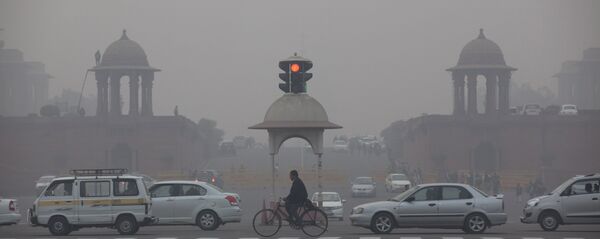Several environmental groups and websites were running a campaign against the Environment Impact Assessment (EIA) draft 2020, including Fridays for Future — the India chapter of the international environmental campaign led by Greta Thunberg — before they were blocked by a public sector company, National Internet Exchange of India (NiXI), chaired by a top bureaucrat from India's Department of Information Technology.
From putting an end to making government documents public for "projects of strategic importance", to a clause allowing project promoters to report violations themselves, different sections have received red flags from environmental activists. Under the post facto regulation of violations, violators can continue on with a project by paying fine for it without the endeavour being halted.
Talking to Sputnik about the Environment Impact Assessment draft 2020, a Mumbai-based lawyer Zaman Ali, who has fought various environment cases, explains the key concerns:
1. Post facto clearance: It allows any project proponent who may have started operations to go on without environmental clearance. They can now apply to regulatory authorities about the violations, but they may remain aloof until the government identifies that this is being done illegally. But they may be asked to pay remuneration costs, which could be a meagre sum. There is no deterrence affect being created. Earlier, it was a "pollute, pay, and shut" mechanism.
2. Reduced number of compliance reports: The number of compliance reports have been reduced for companies, after they receive environmental clearance. Earlier, there were half-yearly reports, which were hardly adhered to, but now it has been converted to an annual report. With this, they have been given more leeway to cover up any damage caused. Many of these reports were completely false previously and the ministry doesn't have enough resources to cross-check violations. The situation will be worse now.
3. Industrial projects under SEZs exempted from public consultation: A lot of projects such as those in the paint industry, dyes-chemical industry, and fertilisers proposed to be set-up in notified sensitive areas or special economic zones (SEZ) are now exempt from public consultation. These SEZs will be moving to more rural areas and with such industries near farmland pose a threat of adverse health hazards as they will have an impact on groundwater and soil fertility.
4. Proponents can fence/level land while environmental clearance requests are pending: This means that proponents can begin the levelling of land and in the case of a slope/hilly area, can cause immense environmental damage. No work should allowed without clearance. With levelling and foundation work done, a proponent can pressure the authorities by saying that it has already spent millions on the project and can't afford not to continue.
5. Projects of strategic importance exempt from making documents public: Earlier, defence and border-related projects were exempt from public hearing, but now projects of strategic importance will also be exempted. With no definition for what constitues strategic projects in the draft, anything can be labelled as strategically important.
Following criticism of the proposed measures by political leaders, Environment Minister Prakash Javadekar said it's a draft, and not a final notification.
"We will consider all the suggestions and come out with the final draft. Those who want to protest now have, during their regime, taken bigger decisions without any public consultation", he said.
The notification was kept up for public consultation for 150 days because of COVID-19. Otherwise, it is only 60 days as per Indian law.
While the final notification will show if the matters raised were considered by the ministry or not, Zaman points out one positive: "The draft has a good definition clause, which was earlier missing. It was left for the courts to define certain terms, which made it difficult to interpret the notification of 2006".







